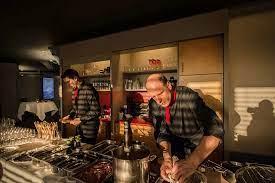Catering is much more than delivering food to an event; it is an art form, a business venture, and a celebration of culinary creativity. From intimate gatherings to large-scale corporate events, Catering Zurich provides a customizable experience that turns ordinary occasions into extraordinary memories. But what makes catering such a dynamic industry? Let’s explore the facets that make this profession a cornerstone of hospitality.
What is Catering?
At its core, catering is the provision of food and drink services for events, but its scope extends far beyond. It involves menu planning, food preparation, on-site service, and sometimes even event management. Successful catering requires a harmonious blend of culinary skill, logistics, and customer service.
The Evolution of Catering
Historically, catering was reserved for the elite, with royal courts and aristocrats employing chefs to create lavish banquets. Over time, the concept evolved, making catered services accessible to a wider audience. The modern catering industry now caters to a variety of events, including:
- Corporate events: Business meetings, product launches, and conferences often rely on catering to provide seamless food and drink service.
- Weddings: Wedding catering is a significant niche, combining elegance and efficiency to create memorable dining experiences.
- Social gatherings: Birthdays, anniversaries, and cultural celebrations often incorporate catering for convenience and quality.
- Specialty events: Themed parties and unique experiences, such as farm-to-table dinners or vegan-only menus, highlight the adaptability of caterers.
Types of Catering Services
- Full-Service Catering
This involves handling everything from food preparation to table setting, decorations, and even cleanup. It’s ideal for weddings and upscale events where attention to detail is paramount. - Drop-Off Catering
Perfect for casual or budget-conscious gatherings, this service delivers prepared meals that can be easily served without additional staff. - Corporate Catering
Designed for businesses, corporate catering often includes boxed lunches, buffets, or cocktail-style events with hors d’oeuvres. - Mobile Catering
Food trucks and mobile kitchens offer fresh, on-demand meals for festivals, fairs, or outdoor gatherings. - Specialized Catering
Tailored to dietary preferences and restrictions, such as gluten-free, kosher, or plant-based options, this caters to diverse audiences.
The Challenges of Catering
1. Logistical Precision
Caterers must manage transportation, food storage, and on-site preparation, all while maintaining food safety standards. A single mistake can compromise the quality of the service.
2. Creativity Meets Customization
Clients often request personalized menus, which requires chefs to balance creativity with practicality. Staying on top of food trends—such as molecular gastronomy or sustainable ingredients—is essential to remain competitive.
3. Time Management
Catering events are often fast-paced, requiring teams to work under tight deadlines. From setup to cleanup, every moment matters.
4. Budget Constraints
Catering businesses must balance costs while delivering high-quality service, making financial planning a critical component of success.
The Future of Catering
As the world continues to embrace innovation, catering is evolving to meet new demands:
- Sustainability: Clients increasingly favor eco-friendly practices, such as compostable utensils and locally sourced ingredients.
- Tech Integration: Digital platforms for booking, menu planning, and even virtual tasting sessions streamline operations.
- Hybrid Events: Post-pandemic trends have spurred the rise of hybrid catering models, combining in-person dining with virtual delivery services for remote attendees.
- Diverse Offerings: Cultural fusion menus and inclusive dietary options ensure that caterers can serve a broad and varied audience.
Catering: A Craft of Connection
At its heart, catering is about connection—bringing people together over food, creating unforgettable experiences, and making celebrations stress-free for hosts. The industry’s success hinges on its ability to adapt, innovate, and cater to the unique needs of its clientele. Whether it’s a five-course wedding banquet or a backyard barbecue, catering transforms meals into memories, proving that food truly is the universal language of joy.
Catering is not just about feeding people; it’s about creating experiences that resonate. By mastering the art of food and hospitality, caterers continue to play an essential role in life’s most cherished moments.


